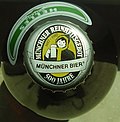Reinheitsgebot
Reinheitsgebot, also known as the German Beer Purity Law, is a regulation concerning the production of beer in Germany. Enacted in 1516 by Duke Wilhelm IV of Bavaria, the law originally stipulated that beer could only be brewed from three ingredients: barley, water, and hops. The omission of yeast from the list was not an oversight; the role of yeast in fermentation was not understood at the time, and it was only later acknowledged as a vital ingredient in beer production.
History[edit]
The Reinheitsgebot was introduced for several reasons: to prevent price competition with bakers for wheat and rye, to conserve cereals for use in bread, and to ensure the purity and quality of beer by banning the use of problematic additives and preservatives. This law is one of the oldest food-quality regulations in the world that is still in use, albeit in a modified form.
Over the centuries, the Reinheitsgebot has undergone several changes and adaptations. With the unification of Germany in the late 19th century, the law was challenged as it restricted the free trade among the German states. However, it was eventually incorporated into German tax law, and its principles continue to influence German beer production to this day.
Impact[edit]
The Reinheitsgebot has had a profound impact on the brewing industry in Germany and beyond. It has been credited with maintaining high standards of beer quality and purity. However, it has also been criticized for stifling innovation by restricting the types of ingredients that can be used in brewing.
In modern times, the Reinheitsgebot is no longer a legal requirement for all beers produced in Germany. However, many German brewers continue to adhere to its principles, and beers that comply with the law are often labeled as "Reinheitsgebot compliant" or similar. The law has also influenced brewing traditions in other countries, with many craft brewers around the world adopting the Reinheitsgebot principles as a mark of quality and tradition.
Contemporary Relevance[edit]
Today, the Reinheitsgebot is both celebrated and debated within the beer community. Some see it as an important tradition that guarantees the quality and purity of beer. Others argue that it limits diversity and innovation in brewing. Despite these differing views, the Reinheitsgebot remains a significant part of Germany's cultural heritage and continues to play a role in the global brewing industry.
-
Freshly picked hops
-
Barley
-
Reinheitsgebot München Viktualienmarkt
-
Münchner Reinheitsgebot
Ad. Transform your life with W8MD's Budget GLP-1 injections from $75


W8MD offers a medical weight loss program to lose weight in Philadelphia. Our physician-supervised medical weight loss provides:
- Weight loss injections in NYC (generic and brand names):
- Zepbound / Mounjaro, Wegovy / Ozempic, Saxenda
- Most insurances accepted or discounted self-pay rates. We will obtain insurance prior authorizations if needed.
- Generic GLP1 weight loss injections from $75 for the starting dose.
- Also offer prescription weight loss medications including Phentermine, Qsymia, Diethylpropion, Contrave etc.
NYC weight loss doctor appointmentsNYC weight loss doctor appointments
Start your NYC weight loss journey today at our NYC medical weight loss and Philadelphia medical weight loss clinics.
- Call 718-946-5500 to lose weight in NYC or for medical weight loss in Philadelphia 215-676-2334.
- Tags:NYC medical weight loss, Philadelphia lose weight Zepbound NYC, Budget GLP1 weight loss injections, Wegovy Philadelphia, Wegovy NYC, Philadelphia medical weight loss, Brookly weight loss and Wegovy NYC
|
WikiMD's Wellness Encyclopedia |
| Let Food Be Thy Medicine Medicine Thy Food - Hippocrates |
Medical Disclaimer: WikiMD is not a substitute for professional medical advice. The information on WikiMD is provided as an information resource only, may be incorrect, outdated or misleading, and is not to be used or relied on for any diagnostic or treatment purposes. Please consult your health care provider before making any healthcare decisions or for guidance about a specific medical condition. WikiMD expressly disclaims responsibility, and shall have no liability, for any damages, loss, injury, or liability whatsoever suffered as a result of your reliance on the information contained in this site. By visiting this site you agree to the foregoing terms and conditions, which may from time to time be changed or supplemented by WikiMD. If you do not agree to the foregoing terms and conditions, you should not enter or use this site. See full disclaimer.
Credits:Most images are courtesy of Wikimedia commons, and templates, categories Wikipedia, licensed under CC BY SA or similar.
Translate this page: - East Asian
中文,
日本,
한국어,
South Asian
हिन्दी,
தமிழ்,
తెలుగు,
Urdu,
ಕನ್ನಡ,
Southeast Asian
Indonesian,
Vietnamese,
Thai,
မြန်မာဘာသာ,
বাংলা
European
español,
Deutsch,
français,
Greek,
português do Brasil,
polski,
română,
русский,
Nederlands,
norsk,
svenska,
suomi,
Italian
Middle Eastern & African
عربى,
Turkish,
Persian,
Hebrew,
Afrikaans,
isiZulu,
Kiswahili,
Other
Bulgarian,
Hungarian,
Czech,
Swedish,
മലയാളം,
मराठी,
ਪੰਜਾਬੀ,
ગુજરાતી,
Portuguese,
Ukrainian




